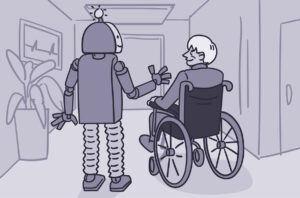Nursing assessment
- Visual acuity
- Psychosocial impact of visual disability
- Level of knowledge of disease
- Comfort and ability to comply with postoperative treatment
Nursing diagnosis
- Self-care deficits related to visual deficit
- Anxiety related to lack of knowledge about the surgical and postoperative experience
Planning
- Preoperative goals
- Make informed decisions regarding therapeutic options
- Experience minimal anxiety
- Postoperative goals
- Understand and comply with postoperative therapy
- Maintain level of comfort
- Remain free of infection and other complications
Implementation
- Health Promotion
- Wear sunglasses
- Avoid unnecessary radiation
- Ensure adequate antioxidant vitamins (e.g., vitamins C and E)
- Ensure good nutrition
- Acute Care
- Teach about disease process and treatment options
- Administer medication
- Inform those with patch that they will not have depth perception
- Teach signs and symptoms of infection
- Ambulatory Care
- Activity restrictions
- Medications
- Follow-up visits
- Signs and symptoms of possible complications
Evaluation
- Have improved vision
- Be better able to take care of self
- Have minimal to no pain
- Be optimistic about expected outcomes
Gerontologic considerations
- Tend to the special needs of the older adult
- Sensitivity to self-esteem
- Promote independence
- Provide support and encouragement
- Address safety issues




